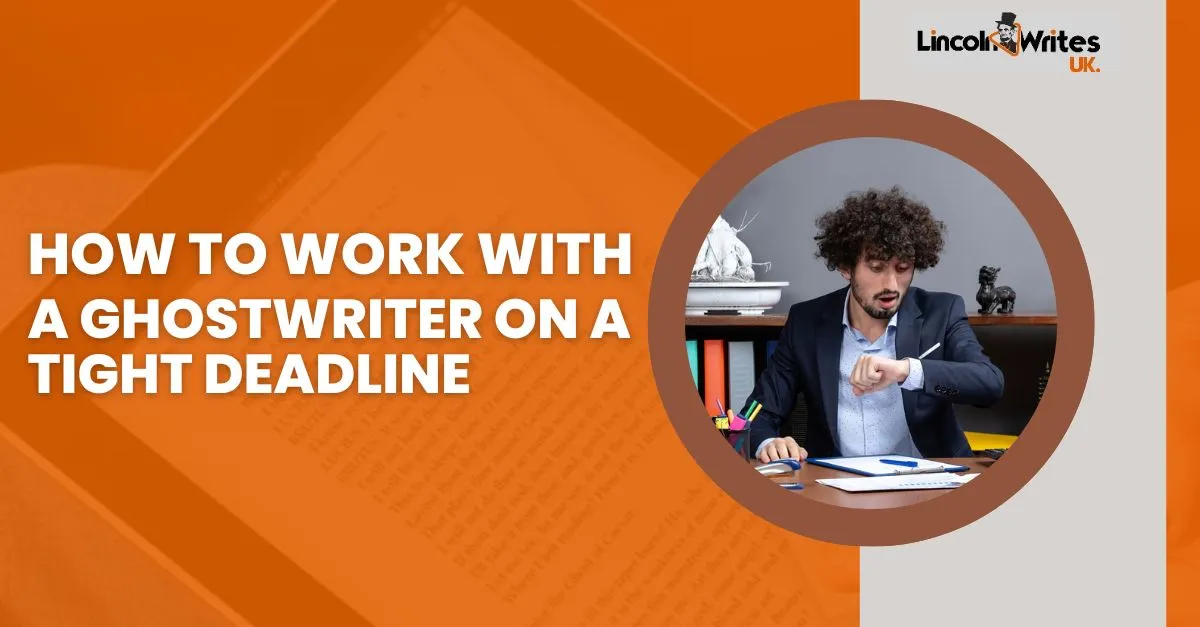Need a book written, and fast?
You’re not alone. Whether you’ve got a major product launch, a speaking gig coming up, or a once-in-a-lifetime opportunity to share your story, time isn’t always on your side.
Enter the ghostwriter.
Working with a ghostwriter is already a smart move, but when time is tight, it becomes a strategic necessity. With the right systems, communication, and clarity, hitting ghostwriter tight deadlines doesn’t mean sacrificing quality.
In this guide, we’ll walk through how to make it happen and how to avoid the stress that usually comes with speed writing.
Why You Might Need a Book, Fast
Ghostwriters frequently work on accelerated timelines. We’re often approached by:
- Business leaders preparing for launches or investment rounds
- Memoirists are ready to tell their story after a major life event
- Marketers crafting branded content for seasonal pushes
- Entrepreneurs need an ebook to tie into lead generation campaigns
Whether you’re going for a traditional deal or planning to choose ebook publisher platforms, timing can shape everything from your production plan to your promotional window.
Step 1: Choose the Right Ghostwriter for the Job
When you’re on a deadline, not just any ghostwriter will do. You need someone who’s:
- Worked under pressure before
- Experienced in your niche (business, memoir, tech, etc.)
- Clear on contracts, rights, and deliverables
Yes, your contract matters, even when you’re rushing. Standard ghostwriting legal aspects like copyright, confidentiality, and scope of work should still be clearly outlined.
Remember: speed should never mean cutting corners on professionalism.
Step 2: Start With a Strategic Kickoff
Every hour matters on a fast-track ghostwriting project. That means skipping the fluff and getting straight into planning.
Here’s what your kickoff should include:
- Clear goals: What’s the purpose of the book? Lead magnet? Authority piece? Saleable memoir?
- Defined audience: Who’s this book speaking to? Industry insiders, future clients, or general readers?
- Topic roadmap: A rough outline, even bullet points, helps the writer structure early drafts.
- Key stories or data: Voice notes, blog posts, presentations, or past writing can accelerate content creation
This is where business leader ghostwriting becomes a hybrid of strategy and storytelling.
Step 3: Embrace Voice Memos and Asynchronous Input
When you’re short on time, you don’t need more meetings. You need fast, flexible communication.
Voice memos are a game-changer. Send thoughts while commuting, between meetings, or during your morning walk. Ghostwriters can then pull quotes, insights, and anecdotes directly from your voice to shape chapters.
If you’re doing memoir ghostwriting, this approach is especially effective. It keeps the emotion raw, honest, and immediate.
Step 4: Approve Content in Phases
Don’t wait for the full draft.
Ask your ghostwriter to submit chapters or sections as they’re completed. This phased approach allows:
- Faster feedback loops
- Corrections before errors compound
- Motivation on both ends to stay on schedule
It also gives you the opportunity to run chapters past beta readers or editors using proofreading checklists, which can feed improvements into future sections.
Step 5: Use Tools to Speed Up Review
On a tight schedule, you can’t rely on old-school editing. Use smart tech instead:
- Proofreading tools 2025, like Grammarly and ProWritingAid, for quick checks
- Collaborative docs with track changes to minimise back-and-forth
- Proofreading symbols for annotated PDFs if you prefer visual markup
Combine automation with expert oversight. If you’re heading to publication soon, don’t skip the human edit. This is where proofreading in self-publishing becomes essential.
Step 6: Know When to Hire a Proofreader
Speaking of editing…
One of the most overlooked steps in rush projects is proofreading. But it’s also where books can unravel if skipped.
You should hire a proofreader immediately after the final draft is approved. Especially if your plan involves publishing with high standards, or if you’re aiming to land in the top ebook distribution channels in the UK.
Don’t forget:
- Print layout and digital formatting both need final checks
- Deadlines for distribution platforms can be strict
- Errors left in a book hurt your ghostwriter ROI more than they help
Step 7: Prepare for Publishing in Parallel
While the ghostwriter works on the manuscript, you can get ahead on publishing prep.
- Draft your metadata (title, subtitle, description)
- Design or outsource your cover
- Explore the ebook publisher marketing support options
- Study emerging ebook publishing trends 2026 UK, so your release is future-proof
This dual-track approach helps you hit your release window without last-minute scrambling.
Bonus Tips for Ghostwriter Tight Deadlines
- Stay reachable. Delays happen when feedback lags. Set expectations and stick to them.
- Trust your ghostwriter. Let them lead the writing process. You lead the vision.
- Be decisive. The tighter the timeline, the fewer rounds of revision you’ll have.
- Avoid scope creep. Additions slow the project. Stick to the agreed plan.
- Focus on value. Whether you’re writing for impact, leads, or brand growth, clarity beats volume.
This is where understanding the difference between traditional vs ebook publishing becomes crucial. Faster turnaround means leaning into platforms that give you more control.
Final Note
Writing a book under pressure is no small task. But with the right collaboration, tools, and mindset, even the tightest timeline can lead to something powerful.
Whether you’re capturing your personal story or your company’s journey, a ghostwriter can meet tight deadlines without compromising. They just demand clarity, commitment, and a partner who knows how to work smart and fast.
At Lincoln Writes UK, our ghostwriting services are designed for authors like you, busy professionals, passionate storytellers, and thought leaders on a mission. We don’t just meet deadlines. We help you beat expectations.
Need a book yesterday? Let’s get started today.


